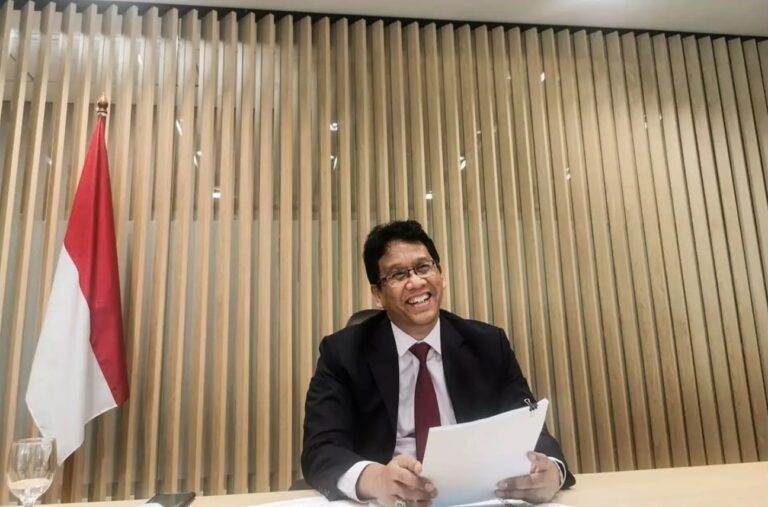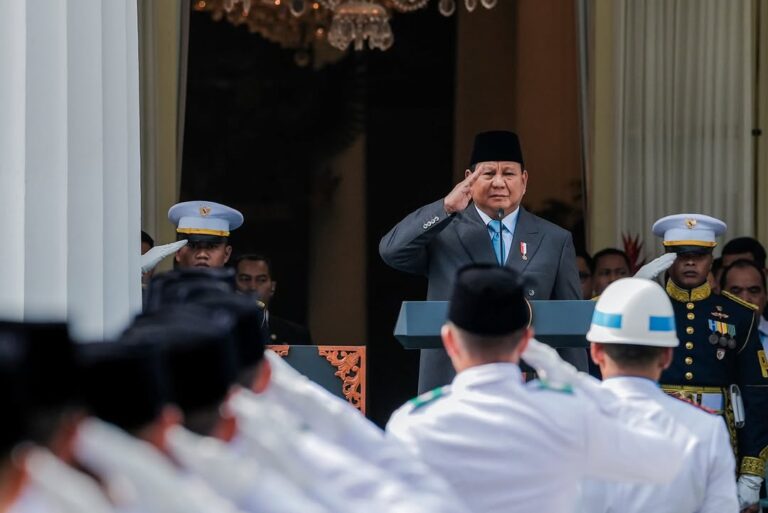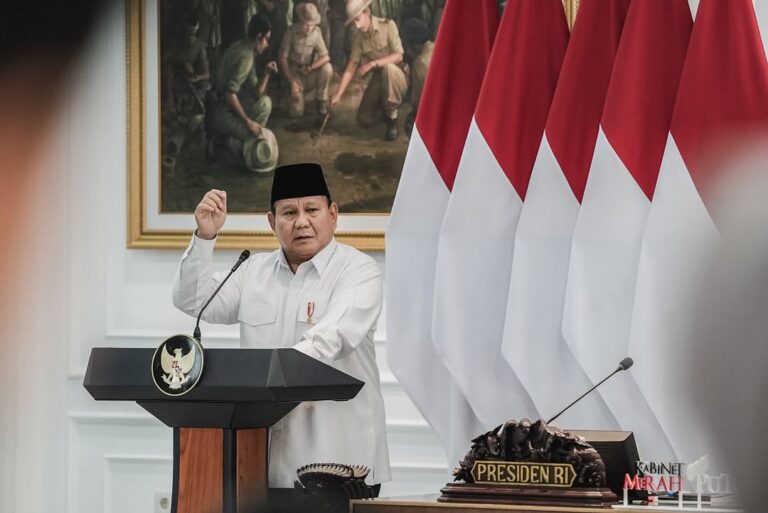American entrepreneur and motivational speaker, Chris Grosser, once famously said “Opportunities don’t happen. You create them.” This powerful insight captures two essential truths: the value of being well-informed and the importance of taking proactive steps.
In this article, we will look at the evolving landscape of property investment in Indonesia and the latest regulations that are shaping a more inviting environment for foreign investors and fuelling dynamic growth in the country’s real estate market.
Indonesia has undergone significant regulatory changes in recent years, aimed at boosting foreign investment in its property market. These changes provide clearer ownership rights and streamline processes for property acquisition. New regulations have introduced clearer guidelines and more opportunities for foreigners to own property, contributing to a more competitive and dynamic real estate sector.
According to guidelines from the Ministry of Agrarian Affairs and Spatial Planning/National Land Agency (ATR/BPN), foreigners can own apartments on land with Hak Guna Bangunan or HGB, Hak Pakai (Right to Use), or Hak Pengelolaan (Management Rights). As M. Basuki Hadimuljono, the current Indonesian Minister of Public Works and Public Housing, stated, “The government ensures the protection of foreign nationals who own properties in Indonesia, including guaranteeing consumer rights as regulated in the Sale and Purchase Agreement (PPJB).”
The introduction of the Omnibus Law (UU Cipta Kerja) has further streamlined property ownership for foreigners. This law aims to improve the investment climate by simplifying regulations and providing clearer guidelines for foreign property ownership. Special visas for property investment have also been introduced:
- A second home visa is aimed at foreigners purchasing property for residential purposes. It allows long-term stays and can be linked with property ownership;
- A golden visa is aimed at high-net-worth individuals, facilitating property investments and offering extended stay benefits.
Property Ownership Titles Available to Foreigners
Let’s start with the basics. Foreigners are allowed to purchase property in Indonesia under specific conditions and titles. The most common property ownership titles for foreigners are:
- Hak Pakai (Right to Use)
- Hak Guna Bangunan or HGB (Right to Build)
- Strata Title (SHMSRS)
Hak Pakai
Hak Pakai, or Right to Use, is a title that allows foreigners to use the land or property for a specific period, typically up to 80 years, divided into three stages: the initial 30 years, a 20-year extension, and a final 30-year renewal. This title can be applied to various types of land, including state-owned land, land with Hak Milik (Freehold Title), and land with Hak Pengelolaan (Management Rights).
Hak Guna Bangunan (HGB)
HGB, or Right to Build, is a land title granted to individuals or entities to construct and own buildings on land they do not own. Foreigners can acquire HGB for various purposes including residential and commercial use. HGB is typically valid for a period of 30 years and can be extended for another 20 years and renewed for an additional 30 years, totalling up to 80 years. Foreigners can hold HGB on state-owned land, land with Hak Milik, and land with Hak Pengelolaan or HPL.
Strata Title (SHMSRS)
Strata Title, applicable to apartments and condominiums, permits foreigners to own individual units within a building constructed on land with Hak Pakai or HGB. The ownership period for strata title properties is also typically divided into stages totalling up to 80 years.
Hak Milik
It Is worth noting here that Hak Milik (what we would call ‘Freehold’), is the strongest form of land ownership in Indonesia, but — and it is a big ‘but’ — it is reserved for Indonesian citizens. There are mechanisms through which HGB can be converted to Hak Milik, but if anyone offers you ‘Freehold’ property through a ‘nominee’ structure, do not take it because using a nominee structure carries significant legal risks. The Indonesian government does not officially recognise nominee arrangements, and such agreements can be challenged, potentially leading to the forfeiture of property rights. That is why it is crucial to consult with a legal expert familiar with Indonesian property law, like Seven Stones Indonesia, before entering into agreements.
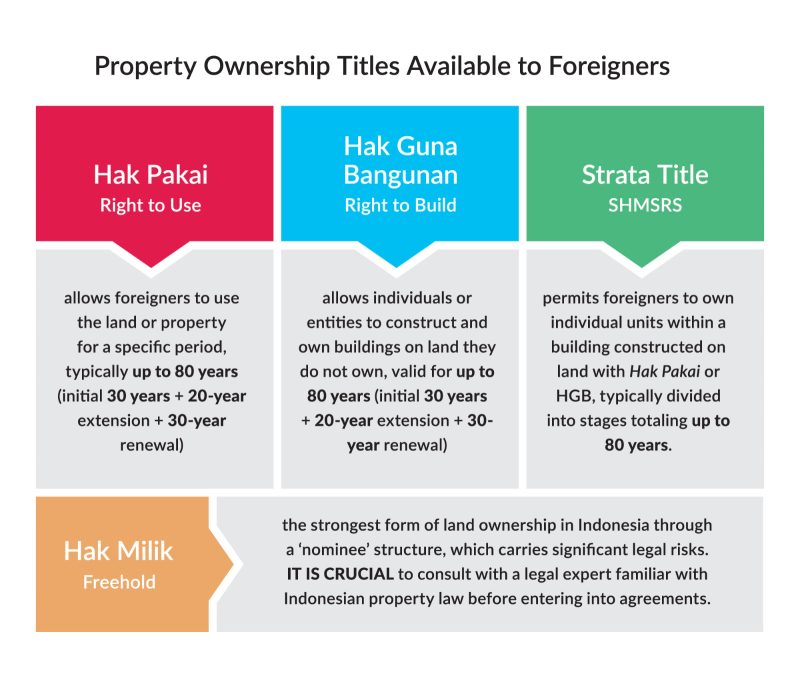
Eligibility and Documentation
To purchase property in Indonesia, foreigners must meet specific criteria and provide necessary documentation, including:
- A passport valid for at least 36 months, valid visas, and residency permits;
- Proof of funds, such as a bank statement or certificate of deposit equivalent to IDR 2,000,000,000 (approximately USD 140,000) in a state bank, or an ownership certificate of a property in Indonesia.
Minimum Price Regulations
The Indonesian government has established minimum price thresholds for properties that foreigners can purchase, varying by region. For instance, in Jakarta, the minimum price for an apartment is IDR 10 billion (approximately USD 700,000), while in Bali, Yogyakarta, and Lampung, it is IDR 5 billion (approximately USD 350,000).
Taxes
Understanding property tax rates in Indonesia is crucial for both local and foreign property investors. These taxes include the Land and Building Tax (Pajak Bumi dan Bangunan or PBB) and the tax on the acquisition of land and building rights (Bea Perolehan Hak atas Tanah dan Bangunan or BPHTB).
While PBB is a relatively straightforward annual tax, BPHTB can be more complex, particularly with regional variations in exemptions. Consulting with local tax experts or legal advisors, such as Seven Stones Indonesia, can help ensure compliance and optimise tax liabilities.
Land and Building Tax (PBB)
Foreign property owners are subject to local tax compliance which includes paying Land and Building Title Transfer Fees as well as Land and Building Taxes (PBB), which varies by region. Recent proposals suggest using a passport as the sole document for PBB registration, further simplifying the process for foreign owners. PBB taxes cover:
- Residential Property: The rate is 0.1% of the taxable sales value (Nilai Jual Objek Pajak or NJOP);
- Commercial Property: The rate can range from 0.2% to 0.3% of the NJOP, depending on the region and the value of the property.
Calculations are based on the taxable value (NJOP), which is determined by the local government and is based on factors such as location, size, and use of the property. PBB, meanwhile, is paid annually.
Acquisition Tax (BPHTB)
The general rate is 5% of the taxable transaction value (NPOP) or the NJOP — whichever is higher. There is, however, an exemption in the non-taxable threshold (Nilai Perolehan Objek Pajak Tidak Kena Pajak or NPOPTKP) that varies by region. For example, in Jakarta and Bali, the NPOPTKP is IDR 80 million while in Yogyakarta and Lampung, it is IDR 60 million. The taxable amount is the NPOP minus the NPOPTKP.
VAT (Value Added Tax) on Property
- Residential Property: Generally, VAT is 10% of the property price, but exemptions and reductions may apply for specific types of residential properties or under certain conditions;
- Luxury Goods Sales Tax (PPnBM): If the property is classified as a luxury good, an additional tax of up to 20% may be applied.
Things to Remember
- Payment Deadlines: PBB must be paid annually, and BPHTB is usually paid upon the acquisition of the property;
- Regional Variations: Rates and exemptions can vary significantly by region, so it is essential to check local regulations.
Tax Benefits for Foreign Investors in Indonesia’s Property Market
Indonesia’s government has introduced several measures to attract foreign investment in the property sector. These include tax benefits designed to make the property market more appealing to international investors, including reduced income tax rates, exemptions from luxury goods tax, double taxation agreements, and deductions for property-related expenses. By leveraging these benefits, foreign investors can enhance their returns and contribute to the growth of Indonesia’s real estate sector.
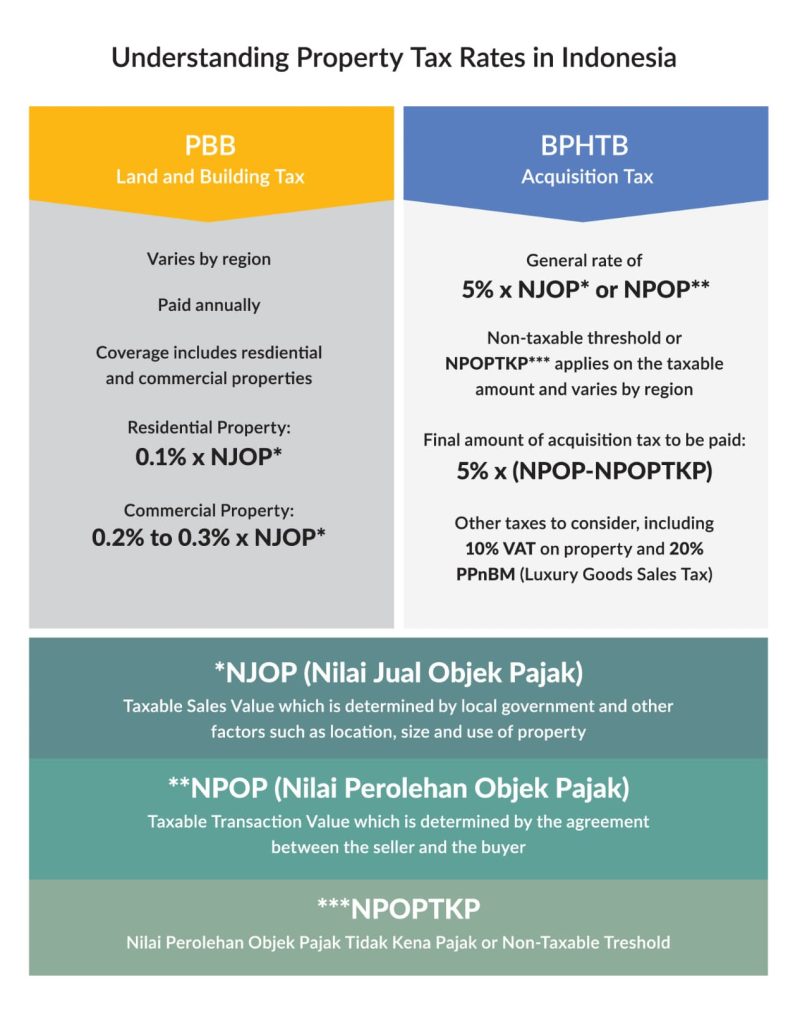
Here are some worth considering:
Reduced Income Tax on Property Sales
- Rate Reduction: The government has reduced the final income tax on property sales from 5% to 2.5% of the gross transaction value for individuals and companies. This reduction applies to the sale of land and buildings, making it more profitable for investors to sell their properties;
- Implications: This tax benefit reduces the overall tax burden on foreign investors, encouraging more transactions and investments in the property market.
Exemption from Luxury Goods Tax (PPnBM)
- Luxury Properties: Properties considered luxury goods are typically subject to a Luxury Goods Sales Tax (PPnBM). However, certain exemptions apply to promote foreign investment in high-end real estate;
- Specific Exemptions: Depending on the property type and investment size, some luxury properties might be exempt from this tax, further reducing the tax liabilities for foreign investors.
Double Taxation Agreements (DTAs)
- Avoidance of Double Taxation: Indonesia has entered into Double Taxation Agreements (DTAs) with several countries to avoid double taxation on income earned from property investments. These agreements ensure that income is not taxed twice, once in Indonesia and once in the investor’s home country;
- Benefits: DTAs typically provide reduced withholding tax rates on dividends, interest, and royalties, making cross-border investments more tax-efficient for foreign investors.
Deductions for Property-Related Expenses
- Operational Expenses: Foreign investors can deduct certain property-related expenses from their taxable income. These expenses include maintenance costs, management fees, and property taxes, which can significantly reduce the taxable income and overall tax liability;
- Capital Allowances: Depreciation of property and capital improvements can also be deducted, providing substantial tax relief over the property’s lifespan.
Investment Incentives in Special Economic Zones (SEZs)
- Tax Holidays: Investments in Special Economic Zones (SEZs) often come with tax holidays, reducing or exempting investors from corporate income taxes for a specified period;
- Additional Incentives: SEZs may also offer other incentives such as reduced property taxes, import duty exemptions, and streamlined administrative procedures to attract foreign investment.
VAT Refunds for Property Purchases
- Refund Eligibility: Foreign investors who purchase property for commercial use, such as hotels or office spaces, may be eligible for VAT refunds on the purchase of goods and services related to the property development.
- Process: The refund process requires documentation and adherence to specific procedures, but it can result in significant savings on VAT expenses.
Resale and Inheritance
Reselling Property
Foreigners can legally resell properties they own in Indonesia. The process involves notarising a Sale and Purchase Deed and registering the transaction with the relevant authorities. All sales and purchase agreements made before regulatory changes in the year 2022 remain valid and can be processed according to previous provisions.
Inheritance
Foreigners can also pass on their property to heirs, provided the heirs meet immigration and residency requirements. It is essential to ensure that the property is properly registered and all legal obligations are fulfilled to secure inheritance rights.
Key Considerations for Foreign Investors
Three aspects should be kept in mind:
- Legal Assistance: Engaging a legal expert is crucial for navigating the complexities of Indonesian property laws;
- Due Diligence: Conduct thorough due diligence to ensure compliance with all legal and regulatory requirements;
- Long-term Planning: Consider long-term plans, including potential extensions and renewals of property titles.
Indonesia offers a promising landscape for foreign property investors, with regulatory frameworks that support and protect foreign ownership rights. Understanding the intricacies of property titles, legal requirements, tax obligations, requirements, and potential risks is essential for making informed investment decisions. With the right guidance and compliance with regulations and local laws, foreigners can successfully navigate the Indonesian property market, secure valuable assets, and enjoy the benefits of owning property in this vibrant and growing market.
Please note that Seven Stones Indonesia has purposely excluded any legal opinions or details regarding the lease structure (Hak Sewa) currently prevalent in Bali. This article focuses solely on ownership options. If you are considering lease arrangements, we recommend exploring Hak Guna Bangunan (HGB) or Hak Pakai (HP) on top of ‘Freehold’ (Hak Milik) as more secure leasing options because the existing structures being used are not designed for long-term leases and, therefore, lack clear definition under Indonesian law, which, in turn, could lead to potential legal and tax complications.
If you would like more information or a free consultation on how to make the most of your property portfolio in Indonesia, get in touch with Seven Stones Indonesia, your partner in growth, via [email protected]


